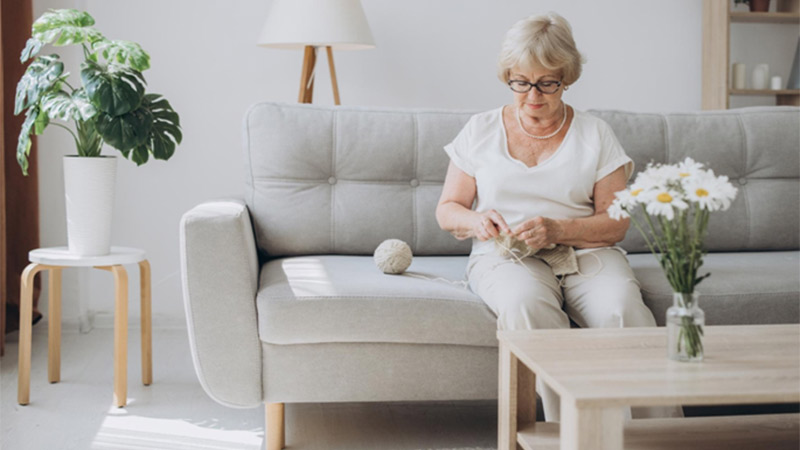Home is where the heart is, but for those coping with dementia, home holds a deeper significance beyond mere comfort. It serves as a lifeline connecting them to their past, their cherished memories, and their very identity. Dementia is a formidable condition impacting countless individuals globally, making the well-being and security of those living with dementia an utmost concern.

Credit: anatoliy_cherkas Via Freepik
Nevertheless, as dementia advances, it can bring forth a variety of difficulties and safety issues that demand diligent consideration. An effective approach to enhancing the quality of life for individuals with dementia involves crafting a secure and dementia-friendly home setting.
Simplify Home Layout
One of the primary goals when creating a dementia-friendly home is to simplify the layout. Minimize clutter, keep pathways clear, and reduce the number of obstacles. This helps prevent confusion and ensures the person with dementia can move around safely.
Improve Lighting
Good lighting can make a world of difference in a dementia-friendly home. Ensure that rooms are well-lit and use natural light whenever possible. Consider motion sensor lights in hallways and bathrooms to reduce the risk of falls during nighttime trips.
Use Color and Contrast
Color and contrast can help people with dementia navigate their environment more easily. Use contrasting colors for walls, floors, and furniture to make objects stand out. For example, a white toilet seat against a blue bathroom wall is much easier to spot.
Install Handrails and Grab Bars
Installing handrails and grab bars in key areas, such as bathrooms and hallways, can significantly enhance safety. These provide support and stability for those with dementia, reducing the risk of slips and falls.
Create Memory Aids
Incorporate memory aids around the house to help jog the person’s memory. Label drawers and cabinets with pictures or words to indicate their contents. A chalkboard or whiteboard in the kitchen can serve as a reminder for daily tasks.
Secure Hazardous Areas
Some areas of the home can pose safety risks, such as the kitchen or stairs. Consider installing safety gates, locks, or stove guards to prevent accidents. Childproofing your home can also be helpful in this regard.
Invest in Comfortable Furniture
Comfortable furniture is essential for a dementia-friendly home. Choose chairs and sofas with firm support and easy-to-clean fabrics. Arrange the furniture to encourage social interaction and create a cozy, inviting atmosphere.
Encourage Familiarity & Routine
Routine and familiarity are essential for individuals with dementia. Decorate with familiar items and personal memorabilia. This can help trigger positive memories and provide a sense of comfort. Family photos, cherished artwork, and familiar furniture can all contribute to a homely atmosphere.
You can also simplify their daily routine, as a structured daily routine can be a lifeline for someone with dementia. Create a visual schedule or calendar to help them keep track of daily activities like meals, medication, and appointments.
Stay Mindful of Kitchen Safety
The kitchen can be a potentially hazardous place for someone with dementia. Keep knives, cleaning products, and other dangerous items locked away. Consider using a knob cover on the stove to prevent accidental use.
Seek Professional Guidance
hen undertaking substantial changes to your residence, it’s advisable to consult with experts, such as occupational therapists or specialists in dementia care. They can offer tailored guidance tailored to your unique requirements.
In some cases, opting for full-time specialized care may be helpful. If your family member is experiencing difficulties in managing daily tasks independently, especially when there’s no one available at home to provide assistance, consider exploring a dementia care home in Toronto to help your loved one out. Transitioning to a specialized residence with trained nurses can provide the necessary support and assurance that your loved one will receive proper care. Take the time to explore different homes and choose a home-like environment with a high staffing-to-resident ratio.




Sending prayers and support. My mother who had been diagnosed with Dementia for 3 years at the age of 82 had all her symptoms reversed with Ayurveda medicine from natural herbs centre after undergoing their Dementia Ayurvedic protocol, she’s now able to comprehend what is seen. God Bless all Dementia disease Caregivers. Stay Strong, take small moments throughout the day to thank yourself, to love your self, and pray to whatever faith, star, spiritual force you believe in and ask for strength, visit naturalherbscentre .com i can personally vouch for these remedy but you would probably need to decide what works best for you